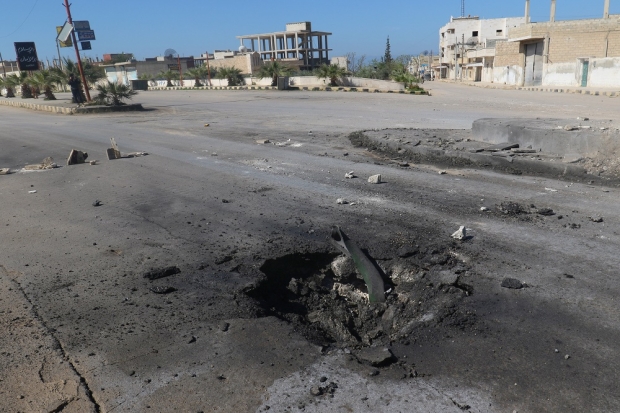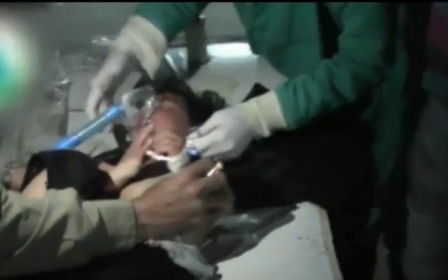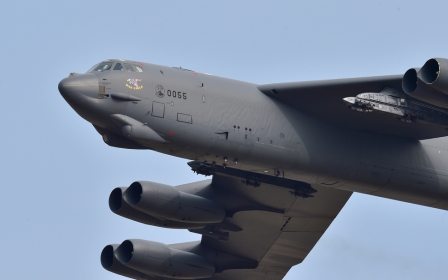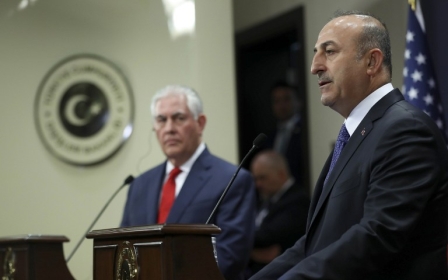'Whole families dead in their beds': Syrian gas attack kills scores
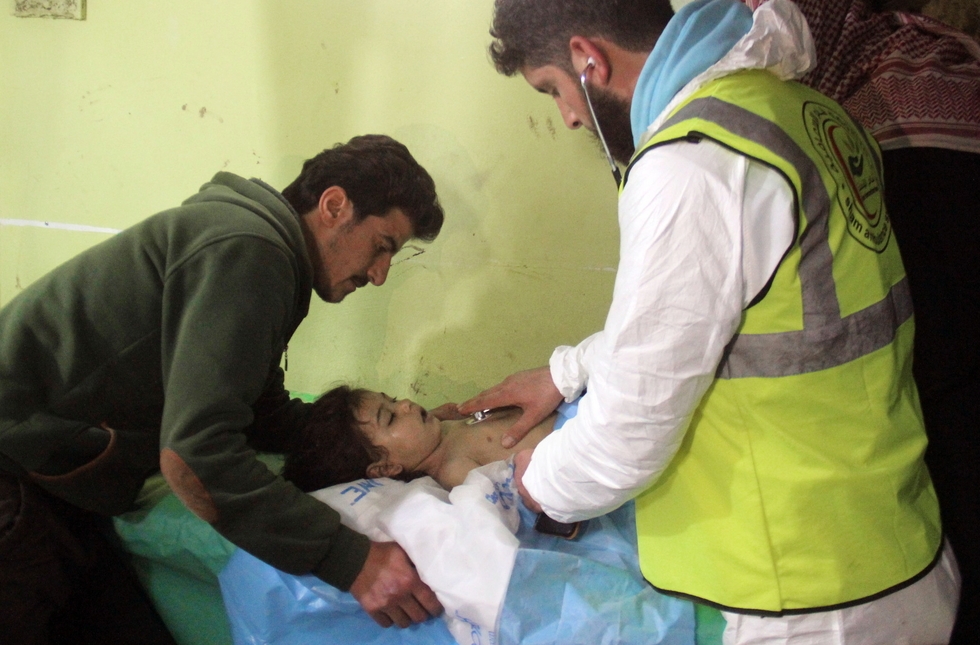
The United States blamed Syrian President Bashar al-Assad for a "reprehensible" and "intolerable" chemical attack in northwest Syria on Tuesday that killed up to 100 people and poisoned hundreds more.
Witnesses described bodies scattered across a residential area of the Idlib town of Khan Sheikhun, after an early morning air attack which released what doctors and experts said was possibly a deadly nerve agent like sarin.
I found bodies scattered all over the area... the vast majority of the casualties were civilian
- Ibrahim al-Seweid, witness
Speaking to Middle East Eye from Idlib, Ibrahim al-Seweid, 26, said he arrived at the attack site at about 11am, about three hours after the initial strike.
"I found bodies scattered all over the area. The local hospital wasn't prepared for the number of dead," he said.
"They hit a residential area, the vast majority of the casualties were civilian. And it was clear it was some sort of chemical attack - the way the victims looked, and there was foam on their faces.
"I could not stay for long, no one did - there were jets still flying in the sky and we feared another attack."
The White House said US President Donald Trump was appalled at the attack, but the US was not prepared to talk about the "next step".
"Today's chemical attack in Syria against innocent people, including women and children, is reprehensible," spokesman Sean Spicer said, adding the administration was "confident" in its assessment that Assad was to blame.
The UN Security Council said it was convening an emergency meeting to discuss the attack. Under a 2013 deal, the Syrian government gave up its reserves of sarin in a deal brokered by the US and Russia following a sarin attack in the Ghouta, outside Damascus, in 2013, which killed hundreds of civilians.
The Syrian government said it had not used chemical weapons, "not in the past and not in the future", and the Syrian army "categorically" denied it was involved in the Tuesday attack. Russia said it had conducted no operations over Khan Sheikhun on Tuesday.
Up to 100 dead
A local activist told MEE that civil defence workers and journalists who arrived early at the site were also affected and taken to hospital. He said 40 people were confirmed dead in the town's hospital, 15 in Maarat al-Numan and two in Kafranbel. But he was sure there were more dead.
The total, 57, was lower than an estimate of 100 dead by the Union of Medical Care Organisations, a coalition of international aid agencies that funds hospitals in Syria and which is partly based in Paris.
A local civil defence official told anti-government news service all4Syria that the target area was low-lying, leading to more injuries and deaths as the chemical agent settled in concentrated areas.
"We ran inside the houses and saw whole families just dead in their beds," resident Abu Mustafa told AFP of the attack's aftermath. "Children, women, old people dead in the streets."
A rocket later hit a hospital in the town as doctors treated victims. The entrance of the building was hit, bringing down rubble on top of medics who had earlier been seen dousing a steady stream of arrivals to wash away chemical residue.
The presenter, Yaman Khateeb, said in a later Facebook post: "There was a young girl who had inhaled toxic gases and was being treated by a doctor in the Khan Sheikhun hospital.
"I was watching her dad as he prayed that God would save her, but the planes finished her off."
Shajul Islam, a British doctor working in Idlib, said in a YouTube video that his hospital had been "overwhelmed" by patients that had been hit by "some sort of chemical".
"This is not chlorine. We do not smell chlorine on this patient," he says in the video, which contains graphic images and should be viewed with caution.
"This is not chlorine gas, we have had a lot of chlorine attacks. This patient has clear pinpoint pupils," he said, in a reference to a symptom of nerve agents.
Syrian government denies involvement
On Tuesday, an unnamed Syrian government official told the Reuters news agency that the government "does not and has not" used chemical weapons, "not in the past and not in the future".
Activists on Tuesday shared images of piles of dead bodies, whom they said were victims, reminiscent of the attack in 2013.
Dan Kaszeta, a British chemical weapons expert at Strongpoint Security, told Middle East Eye that while it was difficult to remotely diagnose the causes, it was "highly plausible" Sarin or another nerve agent was used.
"Initial reports and video evidence show that something other than chlorine has been used. Many medics, who see the victims close up, claim that Sarin or another nerve agent have been used. It is highly plausible.
"The Assad government admitted to having the precursors and manufacturing capability to make both Sarin and VX," he said, adding that Tabun, another nerve agent, could be more easily produced.
Calls for UN investigation
The UN's Commission of Inquiry for Syria said it had begun investigating the attack.
"Reports suggesting that this was a chemical weapons attack are extremely concerning. The commission is currently investigating the circumstances," it said in a statement
"The National Coalition demands the Security Council convene an emergency session, open an immediate investigation and take the necessary measures to ensure the officials, perpetrators and supporters are held accountable," the body said in a statement.
"Failure to do so will be understood as a message of blessing to the regime for its actions."
It accused the "regime of the criminal Bashar" of carrying out the attack, using "shells containing chemical gas".
Soon after, France called for an emergency meeting of the security council as Jean-Marc Ayrault, the foreign minister, described the attack as "monstrous".
The British foreign secretary, Boris Johnson, said those responsible should be "held to account".
"This bears all the hallmarks of an attack by the regime, which has repeatedly used chemical weapons," he said.
US Secretary of State Rex Tillerson issued an appeal for Russia and Iran "to exercise their influence over the Syrian regime and to guarantee that this sort of horrific attack never happens again."
In contrast, Syrian opposition member Basma Kodmani blamed recent statements by Tillerson and US Ambassador to the United Nations Nikki Haley that suggested the new US administration could live with Assad remaining in power for the time being.
"This is a direct consequence of American statements about Assad not being a priority and giving him time and allowing him to stay in power," Kodmani told Reuters via text, saying the US officials' comments amounted to "a blank check for Assad."
The Turkish president, Recep Tayyip Erdogan, said the attack was "inhuman".
Erdogan "warned it risked wasting all the efforts within the framework of the Astana process" to bring peace to Syria, presidential sources said, without indicating who was to blame for the attack.
There have been several recent reports from activists of the use of chemicals by the Syrian government, in Aleppo province and elsewhere in Idlib, despite an alleged ceasefire.
An aid conference on the future of Syria, held by the UN and the EU, is due to begin later Tuesday in Brussels.
Additional reporting Mohamed Shimale from Idlib.
Middle East Eye propose une couverture et une analyse indépendantes et incomparables du Moyen-Orient, de l’Afrique du Nord et d’autres régions du monde. Pour en savoir plus sur la reprise de ce contenu et les frais qui s’appliquent, veuillez remplir ce formulaire [en anglais]. Pour en savoir plus sur MEE, cliquez ici [en anglais].


